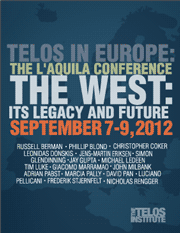At the recent 2014 Telos Conference in New York City, we sat down with Marcia Pally, Professor at NYU, and Ulrike Kistner, Professor at University of Pretoria in South Africa, to discuss the importance of Telos conferences to their work. Here’s what they had to say.
|
This paper was presented at Telos in Europe: The L’Aquila Conference, held on September 7-9, 2012, in L’Aquila, Italy. From my perch, the West hasn’t lost anything but rather has gotten too much of what might be a good thing were there less of it. That thing is separability, and too much of it, untempered by situatedness, yields abandonment and anomie on one hand and selfishness on the other. Of course, too much situatedness would be equally damaging—oppressive and stultifying. It is the binary choice—separabilty or situatedness—that leads the West to the worst of itself. Thus what is needed are frameworks that foster the simultaneous presence of both. Here I’ll point to one, theologies of relationality. The New York Times recently published a letter from Telos Editorial Associate Marcia Pally, who commends the paper for drawing attention to the work of “new evangelicals”:
In this video from the 2011 Telos Conference, held on January 15-16 in New York City, Adrian Pabst interviews Professor Marcia Pally from NYU. Marcia is Professor of Multilingual and Multicultural Studies, and her current work is on “new evangelicals” in the United States and elsewhere. The conversation with Marcia revolves around the long, progressive tradition of evangelicalism going back to the nineteenth century that is coming once more to the fore. Instead of endorsing big government or championing big business, the “new evangelicals” view civil society was more primacy than either state or market. For this and other reasons, they appeal to non-market motives such as solidarity and sympathy in order to transform market institutions and address pressing problems such as poverty, inequality and social exclusion.
|
||||
|
Telos Press Publishing · PO Box 811 · Candor, NY 13743 · Phone: 212-228-6479 Privacy Policy · Data Protection Copyright © 2025 Telos Press Publishing · All Rights Reserved |
||||
 Whatever the ostensible theme of the September 2012 Telos conference, it seems the real one was the mess in the West. Has the West lost its pizzazz, gravitas, ability to guide? Have we become too secular, merely rational, and thus paradoxically ungrounded? Or are we not rational enough, our politics and economics still beset by emotional, quasi-religious beliefs?
Whatever the ostensible theme of the September 2012 Telos conference, it seems the real one was the mess in the West. Has the West lost its pizzazz, gravitas, ability to guide? Have we become too secular, merely rational, and thus paradoxically ungrounded? Or are we not rational enough, our politics and economics still beset by emotional, quasi-religious beliefs? 

